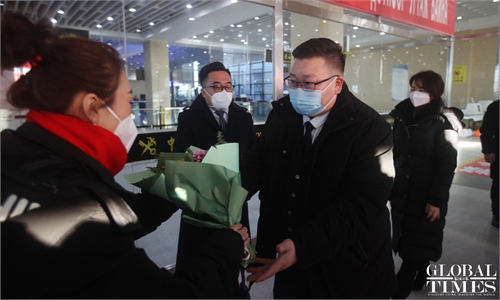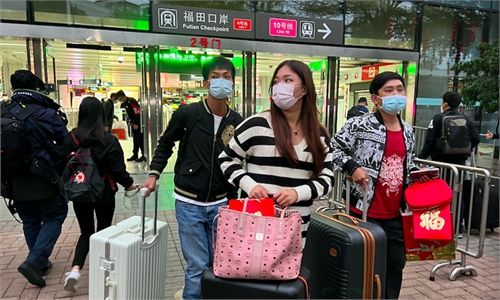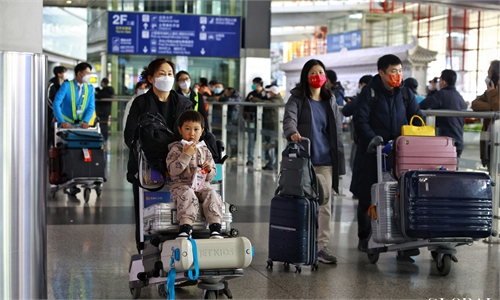GT on the spot: After three years of separation, the special bond between people in both the mainland and HK has only deepened
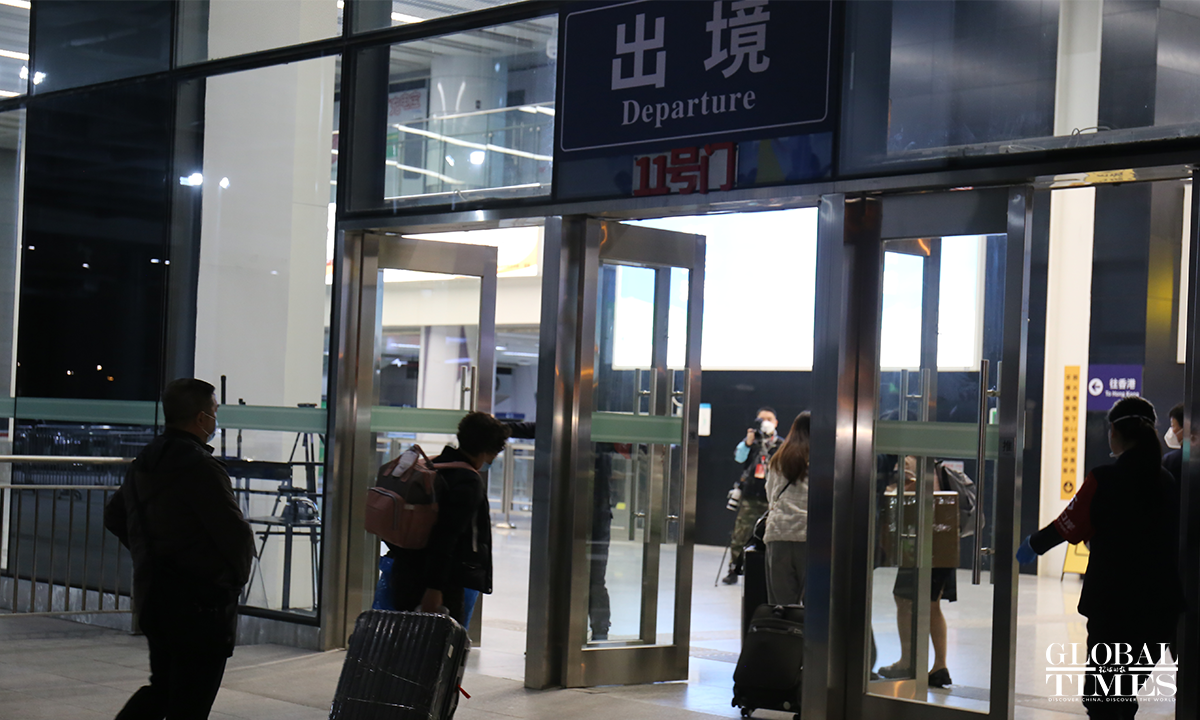
Photo: Zhao Juecheng/GT
The Chinese mainland-Hong Kong border, having been closed due to the COVID-19 management for almost three years, reopened on Sunday, the first day when Chinese downgraded the management of the infectious disease from Class A to Class B.With the new policy in place, the warmth of hugging loved ones, happiness of spending Chinese Lunar New Year with families, excitement of visiting partners for businesses, and, most importantly, the reality of embracing “pre-pandemic normalcy,” is palpable in ports in Shenzhen that connect with Hong Kong.
Although it was only daybreak, and many were sleep-deprived due to over-excitement, travelers arriving and leaving Shenzhen wore smiles, were sanguine and even shed tears. The three-year separation has not dampened their bond with loved ones, but only made them realize the deep ties across the borders, between mainland and Hong Kong.
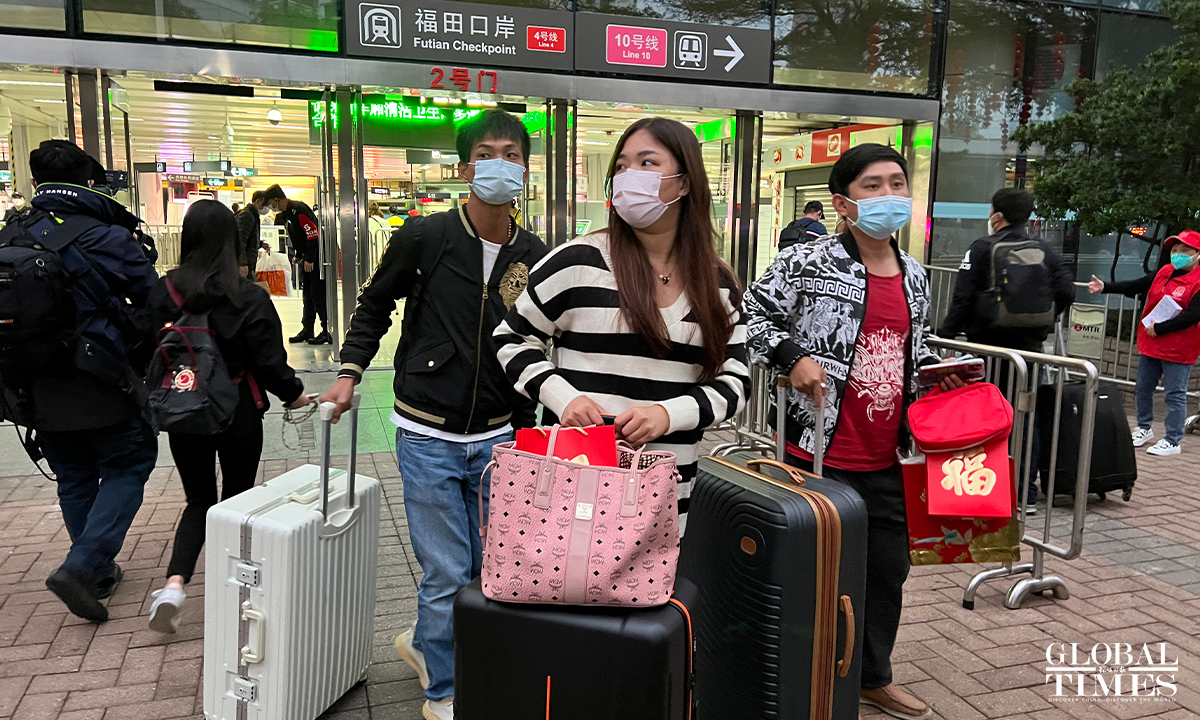
Photo: Zhao Yusha/GT
Several ports in Shenzhen, including Futian and Wenjindu, were decorated with red lanterns and flowers, sign boards such as “Welcome Home,” “We are family” to welcome influx of arrivals from Hong Kong. Most travelers reached by the Global Times hopped on the first train from Hong Kong to Shenzhen, just to meet their family as fast as possible, and they said they are excited that they can finally spend the Chinese Lunar New Year, the most important festival in Chinese culture, with their family following a three-year absence.After hugging her husband at the Futian port’s exit, Ye could not let go of his arms. “This is our first meeting in person after more than two years. I was shocked that how thin he has become after I saw him just now.” Ye said she was struck by both hard feelings and excitement when she heard the news of border reopening between Hong Kong and mainland. “I feel sad because it’s been three years, think of all the time we spent apart; and excited as I can finally meet him again.”
“It was just usual hop-on and hop-off the train before, but three years of separation made me realize how heavy the bond between me and my beloved ones in Shenzhen, between Hong Kong and mainland,” a young person from Hong Kong who only gives his surname Hung, who comes to Shenzhen to visit family, told the Global Times.
Zhang, a mother of 7-year-old boy, moved to Hong Kong three year ago with her husband, but did not anticipate the border to slam shut right after they left the mainland. They were unable to travel back for the last three years.
She rushes back to the mainland with the first group of travelers after the borders reopened on Sunday, because she could finally come back to mourn her mother who passed away during the epidemic.
A Hong Kong resident who gives his surname as Fung unfurled a Chinese national flag the moment when he stepped outside the Futian port, singing patriotic songs at the same time. “The country has protected us for three years… it was not easy,” Fung said, expressing his gratitude for the border reopening.
Dozens employees from a Shenzhen tourist company are also looking eagerly into helping their clients cross the border from Hong Kong. “It’s been three years, so they are nervous and we are also nervous, as we both need to familiarize with the procedure of border crossing and everything again.”
Many left their messages on small notes passed around by working staff at the Wenjindu port. “Thanks to the [central] government for taking care of HK!” one arrival from HK wrote. Another wrote that “hope the all border ports between the mainland and Hong Kong can reopen soon!”
Yet the travelers from Shenzhen to Hong Kong were noticeably more sparse on Sunday, due to the reason that authorities only opened the application process for mainland residents traveling to Hong Kong for tourism since Sunday.
Liu is among the first group traveling from Shenzhen to Hong Kong on Sunday morning. He told the Global Times that he has a meeting with his Hong Kong partners several hours later. “I applied documents as soon as I saw the information of border reopening. I will go to Hong Kong as early as possible to oversee arrival of my goods… now that normal life is back, so should my business,” Liu laughed light-heartedly.
In recent days, Shenzhen’s nucleic test points had seen surging numbers of people asking for test, many of whom are in anticipation of making a trip to Hong Kong. A test point in Shenzhen's Futian district saw a threefold increase in people asking for tests, after the news of border reopening with Hong Kong was announced on Thursday, a medical staff told the Global Times.
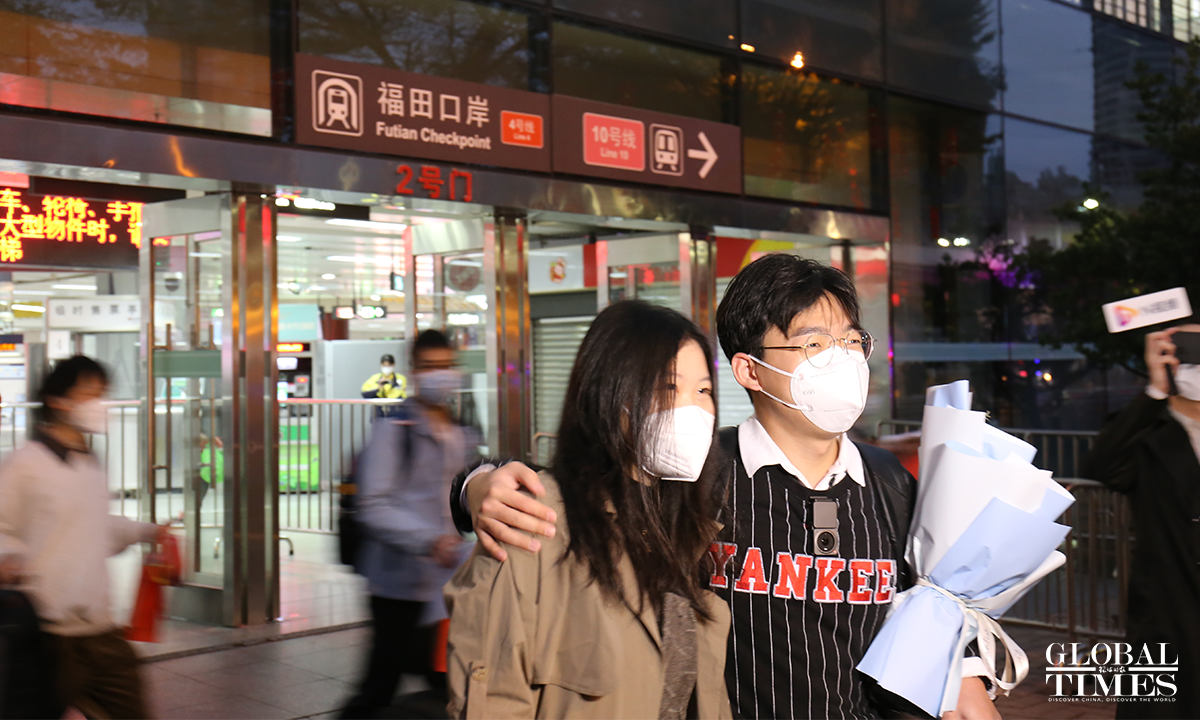
Photo: Zhao Juecheng
Shenzhen authorities said that more than 1,600 individuals had registered to travel from Futian port to Hong Kong on Sunday. About 200 passengers are expected to enter Hong Kong through Wenjindu Port, and 700 from Hong Kong to Shenzhen on the first day of the border reopening. The flow of passengers is expected to increase steadily in the coming days, Tan Luming, an official from Shenzhen port office, told the Global Times on Saturday.
The Hong Kong SAR government said on Saturday that more than 410,000 people in Hong Kong had registered to travel to the mainland as of Saturday afternoon.
When touring a Hong Kong checkpoint on Sunday, the city’s chief executive John Lee said that the first day of border crossing had gone smoothly and the daily quota will be scrapped in the future depending on how the situation unfolds.
On January 5, Hong Kong SAR government officials announced the city will be reopening its borders with the mainland on January 8 to allow up to 60,000 Hong Kong travelers to enter the mainland on a daily basis. A total of seven border control points have resumed operations.
Many Hong Kong media outlets have been reporting on the possibility of people from mainland flooding in to buy up medicine in Hong Kong, as surging cases in the mainland had led to scarcity of fever medicines.
Yet the central and local governments have been ramping up preparation of making up shortage of medicines, in cities such as Beijing and Shanghai, medications can be found on pharmacy shelves again.
Several people who made the trip to Hong Kong told the Global Times that purchasing medicines was off their do-to list. “Supplies of medicines in the mainland are steady those days, so why should I bother to buy them in Hong Kong?”merchant Liu told the Global Times.


